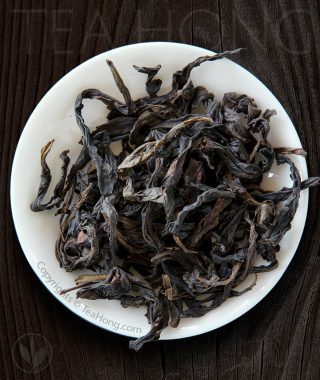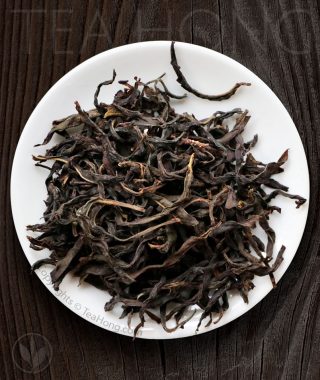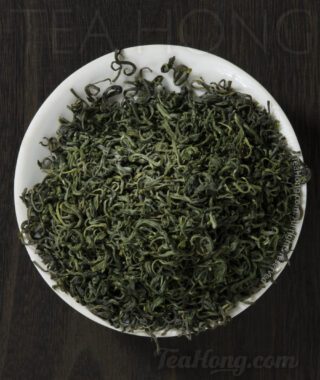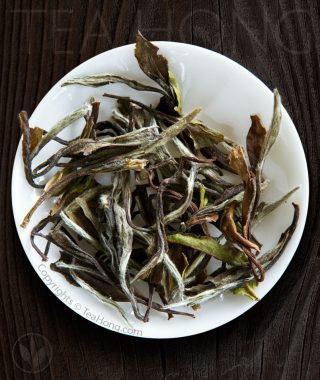$ 41.30
Caolan Dancong — Duck Poo Tea
As a person continues to discover tea, sometimes finding one with subtle and yet complex fineness seems a lot more exciting than one with strong impressions. That is how we feel when we got hold of this. The locals aptly name it “Cao-lan” (Cymbidium goeringii), the rare orchid which ancient Chinese literati had revered for millenniums for its understated beauty and fragrance*. The long, sweet yet subtle taste and aftertaste of this tea echos the sentiments for the civilized persistence for humanity virtues of the classic eras. If you enjoy our Eight Immortals, Orchid Literati will take you to another level.
Net weight: 40 g (1.4 oz) in Kraft-alu pack
Out of stock
鳳凰春茶、鴨屎香單欉
Taste profile
Nose: Prominent, yet soft floral bouquet that is buttery and sweet. Tones of honey, ripen fruits and fresh leafy veggies in the aroma accented with notes of high altitude moss and the freshness sensation of forest after the rain. Palate: Elegantly sweet, smooth and silky full bodied infusion with soft citrus bites. Finish: Long, floral, quenching, refreshing, sweet aftertaste and after aroma with tinkles of citrus.
Infusion tips
For an elegant and superbly fine tea like this, your personal preference matters as to how you prepare it. On the basis of 90°C, use a slightly higher temperature for more emphasis in the bouquet; a slightly lower temperature for an even smoother infusion. Best expressed in smaller vessels, such as a 180 ml gaiwan, using shorter infusion time and more leaves, or in the gongfu approach.
* The label Cao-lan is also perhaps an effort by the locals to give the tea a more civilised aura to balance off the vulgarity of the original cultivar and tea name, Ya-shi Xiang, known to some as Duck Poo Tea. Genuine quality Ya-shi Xiang has always been a much demanded, rare and high price tea even in the local community. Read more about the name here.
Additional information
| Weight | 90 g |
|---|---|
| Dimensions | 18 × 9 × 5 cm |
| Net weight: | |
| Tea category: | |
| Class: | |
| Recommendation: | |
| Origin: | |
| TCM character: | |
| Packaging: | |
| Infusion color: | |
| Vintage |
Reviews(3)
Only logged in customers who have purchased this product may leave a review.

Narcissus Classic, Wuyi yancha oolong
Tea, Oolongs, Wuyi-shan, Denser Aromas, Fuller Bodies, Warm EnergyDark Rock Shuixian:
This tea may have the same name as some low quality tea used in dimsum restaurants but it certainly tastes differently. It is the ORIGINAL Shuixian, the famous oolong that grows on dark rock cliffs in the depth of Wuyi Mountains. Narcissus Classic, like most other deeper baked oolongs, goes well with a wide range of cuisines and desserts and is a great digestive. Also an adaptable tea for preparation with other ingredients, such as ginger and raw sugar, and a safer tea for the weaker stomach.
Orchid Gratus, Phoenix dancong oolong
Tea, Oolongs, Fenghuang | Phoenix, Floral Aromas, Fuller Bodies, Neutral EnergyWudong Xingren Xiang
For people who like classic style Phoenix but desire something more mellow than Honey Orchid, Orchid Gratus offers a taste that is as full-bodied. It is balanced with as subtle a warm and slightly sweet aroma. Not only is this a great choice for the veteran tea connoisseur who seeks peace in the cup, but is also a bridge between softer oolongs and the more vibrant world of taste in Fenghuang Dancong.
April Mist, traditional green tea
Cool Energy, Green teas, Lighter Aromas, Milder Tastes, Tea, ZhejiangWild Bush Yunwu:
For those who prefer a little more strength in their green tea, April Mist is a pleasant choice. Harvested from scattered wild tea bushes in late March or early April, depending on the conditions that year and pre Qing Ming nevertheless, in the misty days of the mountainous region for a deeper taste. Lightly roasted for a balance of warmth, aroma and refreshing brightness, this Yunwu (translate: cloud and mist) makes a distinct difference from its counterparts that may look similar.




This tea is an enigma. It’s a Pandora’s Box of flavors and sensations that shows a different side of itself every time you brew it up. Like a chameleon, it is very colorful and dynamic, and constantly shifting around as the soup cools, or as the leaves are being warmed back up as more water is poured into the brewing vessel.
It’s also a very sophisticated and elegant experience. The complex nature of Ya Shi Xiang as a cultivar is perfectly captured in Tea Hong’s Orchid Literati – it would be difficult to find a deeper, rounder, and more wholesome expression than this, despite Ya Shi being a popular cultivar.
It’s not just the additional layers of flavor that make Orchid Literati stand out as one of the very best Ya Shi you could ever hope to find, it’s the additional dimensions. Much like watching an old movie on a flat-screen, in black-and-white, then watching that same film re-mastered in 3-D with ultra-high definition colors, so too does this Orchid Literati re-master and upgrade my experience with a cultivar that I know and love.
Besides the sheer breadth and depth of the flavor profile, one thing that really stands out to me about Orchid Literati is how clearly the terroir comes across – I can taste the soil and feel the minerals which fed these trees, and that alone is deeply quenching for my dancong-drinking soul.
It’s not difficult to find a “good enough” example of Ya Shi because it’s an easily-approachable cultivar and there are a lot of really good examples out there… but quality of this caliber is exceptionally rare, and for the price point this sits at, it’s a no-brainer to pick up a bag (or two) and experience the magic for yourself.
Indeed, better known Phoenix cultivars are widely planted throughout the Fenghuang area and well beyond, for obvious commercial incentives. In some gardens the harvest can be disciplined and the processing respectfully done. In some others, outputs are maximised for cashflow. The latter ones are quantitatively far more substantial. They are sold in the same name nevertheless. As a result, you can most certainly come across the same label here and there, with whatever origin or master maker your purveyor might tell you, basing on whatever information he/she has been given, or want to give.
A recent visit to a few popular teashops in London, however, has given me a new level of understanding of this phenomenon. There is no limits to how low the quality a Ya Shi Xiang — Duck Poo tea ( they call it Duck Sh*t tea, by the way ) can be and still demanding a premium price. I have tasted quite a few quality levels in my 20+ years in this trade and have honestly never came upon such lowly ones. They did not even taste like anything from Fenghuang at all.
People are still buying there because they do not know any better. On one hand, I am happy that people are interested in exploring the world of finer teas, on the other, however, I think it is dangerous that the spread of such fraudulent quality, will, in the long run, destroy the future of the market for good tea. When people have attempted to find a finer tea and found not much to enjoy even in a premium price product that they do not know is an unauthentic one, they simply will grow disinterested in the category all together.
As in the spirit of the traditional literati, it is all the more an obligation that I have to bear to make sure the genuine quality get delivered to the market, for the sake of the future of good tea. That is also why I am grateful for customers like you, N.N., who would take the extra step in sharing the tea experience with more people. It is far more than the feeling of being appreciated, your sharing is even more effective than our efforts in involving the market for the interest in the real thing. Hopefully someday good tea will drive out bad.
It’s all about subtlety
All in this marvelous tea is subtle: the clear infusion color, the elusive smell a combination of fine cream and fresh flowers, and the soft tangerine taste that emerges from the infusion when it becomes colder. Warning: there is a serious risk to become “teaholic” at first try.
a good tea
TeaHong describes this tea accurately: sweet, smooth, etc… In order to achieve the tea’s profile, paying attention to the water’s temperature and steeping time is needed.